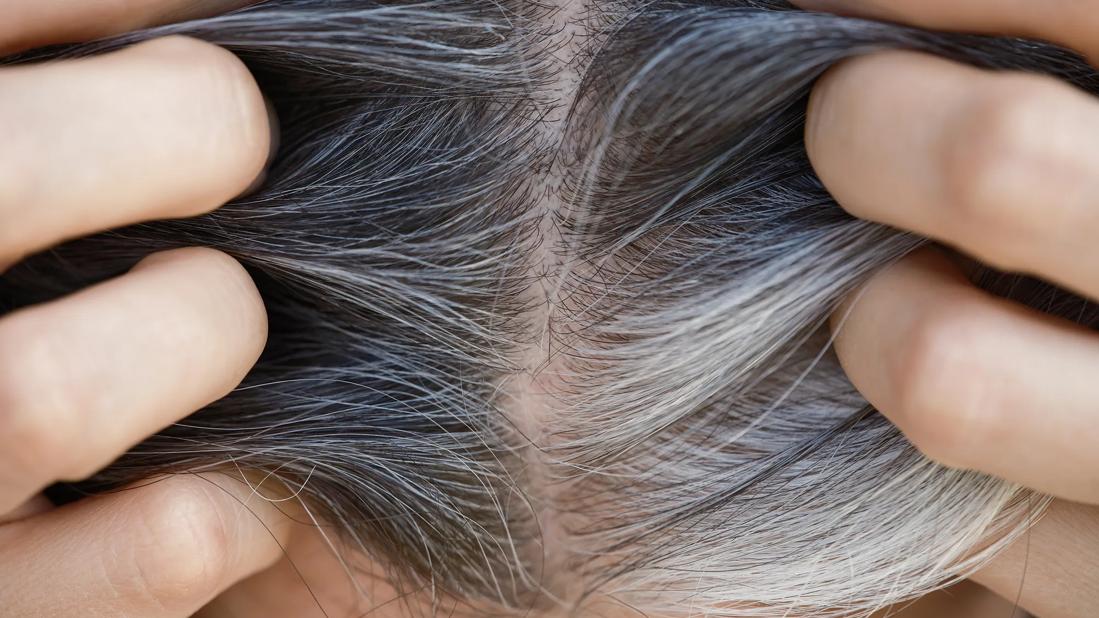Age is the most likely reason for typical graying, but premature graying may be caused by stress, diet, smoking or autoimmune disease

A silver strand catches your eye as you look in the mirror. You immediately lean in for a closer inspection. Your fingers tousle your hair in a frantic search. Could there really be a gray hair on your head?
Advertisement
Cleveland Clinic is a non-profit academic medical center. Advertising on our site helps support our mission. We do not endorse non-Cleveland Clinic products or services. Policy
The answer is yes because going gray is a natural part of human development (even if many people dread it, given societal feelings about aging).
But why does hair turn gray and — maybe more importantly to some folks — can this transformation be delayed or even prevented? Let’s find out from dermatologist Wilma Bergfeld, MD.
A natural pigment called melanin dictates the color of your hair. Different blends can tint your hair hues of black, brown, blonde or red. “The amount and combination of melanin determines hair color,” explains Dr. Bergfeld. “It’s like paint-mixing.”
But as you age, cells in your hair follicles called melanocytes produce less melanin. It could happen because the color-producing cells wear out, get damaged or lose support systems in the body.
Whatever the reason, the reduction in melanin fades your hair to shades of gray. White hair is a sign of very little or no melanin production.
Research shows that most people start seeing gray hairs on their head in their 30s or 40s, though timing often varies from person to person. People who are white typically go gray earlier than people who are Hispanic, Asian or Black.
Aging isn’t the only thing that may turn hair gray, says Dr. Bergfeld. Younger folks may see silver streaks in their hair for the following reasons:
Advertisement
If your hair turns gray, it’s unlikely you’ll see it regain color naturally.
Once cells stop making melanin, they typically don’t ramp production back up. That’s particularly true when it comes to age-related color changes. There’s simply no turning back the clock. (Sorry.)
Lifestyle changes may help you slow the graying process if it’s related to controllable issues like stress, nutritional deficiencies or cigarettes. Resolve those and you may find that you keep more of your natural color.
But even in those situations, don’t expect gray hair to go back to its previous hue, says Dr. Bergfeld.
It should be noted, though, that the natural look of gray hair is trending these days! But if that’s not what you want to see in the mirror, hair dye offers a rainbow of options to tint every hair on your head.
Advertisement
Learn more about our editorial process.
Advertisement

Rosemary oil’s antioxidant, anti-inflammatory and antimicrobial properties could help stimulate hair growth

Scalp cancers can occur because of long-term sun exposure

Soften your skin with warm water and shaving cream before shaving with the grain of the hair

Focus on nutrition, gentle styling habits and adapting to your hair type

Eating whole grains, salmon, fruits and vegetables can help you achieve longer, healthier locks

Your genes, ethnicity, diet and stress levels may all affect your facial hair

Your hair removal routine will depend on your pain tolerance, budget and skin sensitivities

Prepping the area, exfoliating beforehand and communicating with your esthetician will help give you the best (and least painful) results

Wearing a scarf, adjusting your outdoor activities and following your asthma treatment plan can help limit breathing problems

Your diet in the weeks, days and hours ahead of your race can power you to the finish line

When someone guilt trips you, they’re using emotionally manipulative behavior to try to get you to act a certain way